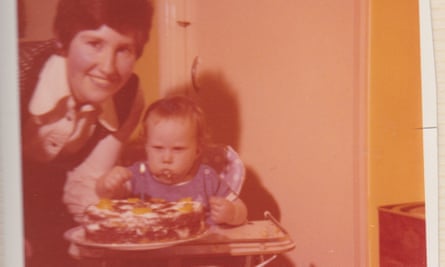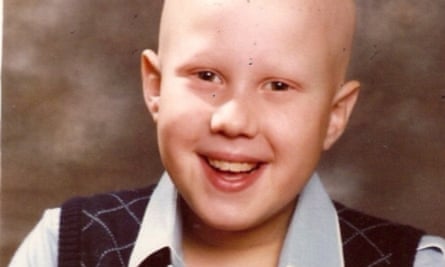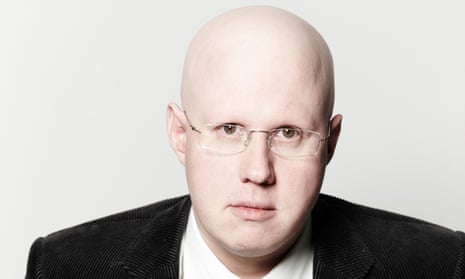One of my earliest memories is of being three-and-a-half years old at nursery, watching the other little boys and girls skip out of the classroom and noting how the folds in the backs of their legs were unblemished. My own legs, like my arms and neck, were already riddled with scratches. I had been told repeatedly not to scratch – but if I didn’t scratch then there was nothing to do but wheeze. And, oh, how I wheezed. Dr David said I had eczema and asthma and hayfever, and gave me some special cream and a blue and white Ventolin inhaler, which I was to use every morning and every night and in between, if necessary.
From a young age I felt at odds with my body. This blotchy, dumpy vessel betrayed my boisterous, carefree spirit. I wanted to run, jump, climb – and I did, but within seconds I was bent double at the kerb, gasping for air.
And yet I remained funny, cheeky Matthew. Inquisitive, outgoing, playful, I had many friends, who I entertained with songs and jokes and silly voices aplenty. Even on the sidelines, while the others played football, I would pretend to be a TV commentator. My asthma and eczema were an inconvenience but they didn’t define me.
However, an event would soon occur that would shape my childhood.
In 1978, when I was four, Mum and Dad took my older brother Howard and me to Portugal on a family holiday. I was struck with wonder at the otherness of everything, and was easily distracted. I was always lagging a few steps behind, and my poor parents were constantly having to remind me not to wander off on my own.
One day, while we were walking along the street, I got separated from my family. I looked up and they were nowhere to be seen. I cast my eyes up and down and across the road. There were several people around and from a distance quite a lot of them looked like my mum and dad.
Eventually, I spotted them, on the other side, waving anxiously at me. I stepped off the kerb, into the road, and was knocked down by a car. A small crowd gathered. My distraught father ran over, picked me up off the ground, swore at the driver, kicked the car and carried me off.
At school I recounted the story to friends and teachers. I enjoyed the drama of it. My father, coming to my rescue. Me, the survivor.
Two years later, in 1980, aged six, I woke up one morning to find several hairs on my pillow. The next day the same thing happened, only this time there were a lot more. By the end of that summer all my hair had fallen out.
I wasn’t initially all that concerned. At four my hair had been blond and curly, but at five it was a big, brown pudding bowl and I loathed it. Why couldn’t I have nice short hair like the other boys?

In the changing room at school – a 10-minute walk from our home in Stanmore, northwest London – I could do nothing but laugh as I easily pulled out the last two or three remaining strands in front of my friends. It didn’t feel real.
But it was.
The doctors – and we saw an endless stream of them – concluded that it must have been a delayed response to the shock of being knocked down by the car in Portugal two years earlier. And so I was the first six-year-old in my class to learn the word “alopecia”.
Suddenly everything and anything else that I was at that age was eclipsed by the fact that I was the little boy in the town with absolutely no hair. And that is how it was, from the age of six for the remainder of my youth. Right up until I became famous, my lack of hair was considered the most – perhaps even the only – notable thing about me.
I was never allowed to forget for one moment that I was bald. If I went swimming or to the cinema or got the bus or went to a shop or simply walked down the street, adults and children stared at me.
“You got no hair,” said the younger kids, pointing.
Others who had previously called me Matthew now yelled “Baldy!” as I passed by. Or “Skinhead” or “Slaphead” – but mainly “Baldy”.
My baldness was a source of amusement, sympathy and revulsion for everyone.
Some people chose to inform me that I had something called leukaemia. “You’re dying,” said one of the older girls in lunch break one day, matter of factly, as she tossed an apple core, missing the bin.
Initially it was speculated – almost assured – that this was temporary, that my hair would grow back almost as quickly as it had fallen out. And it did. A year after it disappeared, it started to return, thinner than before, yes, but this was definitely progress.
Then it fell out again.
The search for a cure began in earnest. I was taken out of school here and there and we’d traipse down to central London on the tube to meet various specialists. Everyone had an opinion; no one had a solution.
I was prodded and poked and gazed at with curiosity, but with few conventional medicinal treatments available to us, we started to go down the homoeopathic route. On Saturday mornings I started to see a friendly acupuncturist. My dad would sit with me while the acupuncturist stuck needles into me, but that didn’t seem to do anything either. I don’t know anybody who enjoys having needles stuck into them and I was quite relieved when we stopped going.

In 1981, I was seven years old. And apart from that brief period when the hair grew back, I had been bald for a year. It became clear that nothing had worked because nothing was going to work. My dad said he thought “the roots might be dead by now”. And that was that.
My childhood was tough, yes. No one wants to feel eternally self-conscious, constantly stared at, teased, mocked and bullied. But also it’s important to get things into perspective.
Being bald has helped me in my career. Would I have had my big break as a baby in Shooting Stars if I had had a full head of hair? My baldness has made me distinctive, yet also allowed me to transform myself. Stick a wig on and I’m someone else. Swap the wig and I’m now another person. Perfect.
My parents first suggested to me that I might want to wear a wig at secondary school. Certainly I didn’t question it as I do now. What the hell was everyone thinking?
It was 1985, a full five years after my hair had fallen out. Five years. I had already done my best to somehow assimilate my baldness into my personality. I had figured out jokey responses to the same old questions if I was in a good mood, and withering retorts if I wasn’t. I had mastered the art of staring back fearlessly at people when I caught them sneaking a look at me. I had figured out, in my own way, how to live with being bald.
This was survival, turning a disadvantage into something I could own, but in my heart I still wanted to be just like everyone else. Maybe the wig could do that for me.
I was assessed again by a doctor and then told that, yes, I could have a wig on the National Health Service, so off I went with my mum and grandma to a wig store in central London, where the offending item was waiting for me.
I don’t know if they make wigs for children nowadays, but they certainly didn’t in 1985. A large, brown human-hair wig – intended for a woman – was placed on my little head and cut down to size. Back at home I put it on and looked at myself in the mirror. I didn’t like it, but I also didn’t really feel – having come this far – that I could or should just give up on it. The fact that I didn’t have any eyebrows made the giant hairpiece look even more unconvincing, but I don’t think it occurred to anybody to teach me how to draw my eyebrows in.
For a few days I wore the wig around the house to get used to it. And then one morning I tottered up the road to the primary school where I had been going every day for six years – but now with a colossal wig on my head.
I walked across the playground. Suddenly, without saying a word, one of the tough boys in the year above me ran past, whipped it off and threw it on the ground. I picked it up in tears and hurried off to seek the comfort of a teacher.
I persisted with the wig for a few more days, but summer was approaching and it was just too hot and uncomfortable. I would slip it on and take it off as if it were a hat. Before long I was passing it round the class, letting everyone have a go.
Poor Wiggy. It was only trying to help. Instead it found itself unceremoniously tossed into a cupboard where it stayed.
Years later, well into adulthood, I was speaking to a doctor who asked me how I had lost my hair. I told him the story about being knocked down by the car and how it had been assumed that it was the shock that had made it fall out two years later. It was a story I had recounted so many times that it was gospel to me now. I no longer questioned it.
But he did.
He asked me if I had asthma, eczema, hayfever or allergies. I said yes, funnily enough, the lot – chronically.
He said that my hair loss was most likely the consequence of my having an overactive immune system, one that was constantly fighting, even when it had nothing specific to beat. No one could say exactly what had made it “reject” the hair, but it wasn’t necessarily anything as dramatic as being knocked down by a car.
I asked him what the significance of having this overactive immune system was and how it was likely to affect me.
“Um, well, you’ll probably never get cancer, actually.”
For a brief moment I felt like a superhero. Then he added, “But there’s about 55 other things that might well get you, I’m afraid.”
I took a deep breath. “So it’s a shorter life?”
He shrugged. “You could get hit by a bus tomorrow.”
“Wouldn’t be the end of the world,” I replied. “Maybe the shock would make my hair grow back.”
Little Me: My Life from A-Z by Matt Lucas is published by Canongate at £20. To order a copy for £17, go to guardianbookshop.com

Comments (…)
Sign in or create your Guardian account to join the discussion